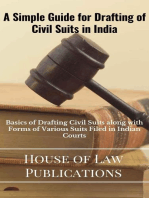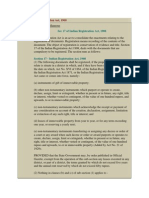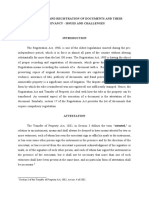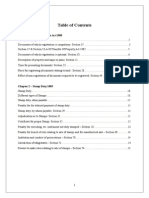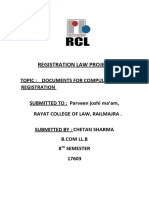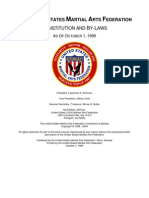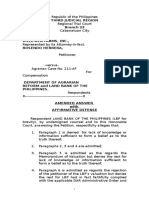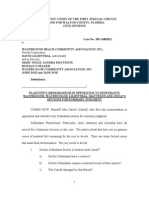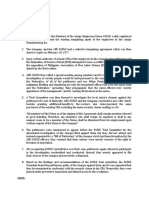TOP Assignment
TOP Assignment
Uploaded by
Sneha SharmaCopyright:
Available Formats
TOP Assignment
TOP Assignment
Uploaded by
Sneha SharmaCopyright
Available Formats
Share this document
Did you find this document useful?
Is this content inappropriate?
Copyright:
Available Formats
TOP Assignment
TOP Assignment
Uploaded by
Sneha SharmaCopyright:
Available Formats
SNEHA B.A.LL.B (5TH SEM) ROLL NO.
983061 TRANSFER OF PROPERTY ASSIGNMENT
TOPIC: - DOCUMENTS OF WHICH REGISTRATION IS OPTIONAL
There are several documents which are not compulsorily registerable under Section 17 of the Registration Act.. Some of them require high stamp duty under the Karnataka Stamp Act and some of them do not. Even the ones which require high stamp duty, if they are under stamped, can be rectified later by paying a penal amount 10 times the original amount. Non payment of stamp duty does not make the document void or otherwise invalid. The consequences of under stamping as per the stamp act are 1. to make the document inadmissible for evidence before any authority capable of receiving evidence of before any public authority. 2. The document can also be impounded for enforcing the payment of full stamp value. An under stamped instrument can be admitted as evidence in court if penal stamp duty 10 times the value of the original amount is paid. According to Registration Act , 1908 Any of the following documents may be registered under this Act, namely:(a) instruments (other than instruments of gift and wills) which purport or operate to create, declare, assign, limit or extinguish, whether in present or in future, any right, title or interest, whether vested or contingent, of a value less than one hundred rupees, to or in immovable property; (b) instruments acknowledging the receipt or payment of any consideration on account of the creation, declaration, assignment, limitation or extinction of any such right, title or interest; (c) leases of immovable property for any term not exceeding one year, and leases exempted under section 17;
16[(cc) instruments transferring or assigning any decree or order of a court or any award when such decree or order or award purports or operates to create, declare, assign, limit or extinguish, whether in present or in future, any right, title or interest, whether vested or contingent, of a value less than one hundred rupees, to or in immovable property; (d) instruments (other than wills) which purport or operate to create, declare, assign, limit or extinguish any right, title or interest to or in movable property; (e) wills; and (f) all other documents not required by section 17 to be registered.
BENEFITS OF REGISTRATION OF DOCUMENTS
Registration of some documents like sale deeds of immovable property is compulsory. The registration of other documents which are not required by law to be registered is optional. Documents which are by law required to be registered carry a certificate of registration which is endorsed by the registering officer and is signed, sealed and dated by him. Such certificate endorsed on the document is admissible for the purpose of proving that the facts mentioned in the endorsement have occurred as therein n mentioned. Hence, an endorsement by the sub-registrar on a registered document that its execution was admitted by the executant, is admissible for the purpose of proving that the executant admitted the execution of said document before sub-registrar.
Similarly, endorsement regarding payment of consideration by the vendee to the vendor in presence of subregistrar is admissible for proving the payment of consideration. Registration of a document is also a notice to the general public regarding the transaction in question.
REQUIREMENTS OF A VALID WILL AND WHAT ARE THE BENEFITS OF GETTING A WILL REGISTERED Every Will has to be attested by at least 2 witnesses. Registration of Will is optional. However, registered Will is usually considered more reliable as there are lesser chances of fabrication. A will is not compulsorily registrable and non registration does not affect its validity. However it would be useful to register a will for the following reasons:-
i)
ii) iii) iv)
A registered will cannot be tampered with, destroyed, mutilated or stole Is kept in the safe custody of the Registrar. Is confidential and not accessible. Is easier to establish in courts of law.
In conclusion always register a document which is compulsorily registerable or for which stamp duty is not high. Documents for which stamp duty is high and which do not require registration do not become invalid for want of proper stamp duty alone. But the rights of both parties should be protected in case of default, so consult a lawyer. Always give possession separately and never in the documents itself.
You might also like
- Amended Reply DV ActDocument26 pagesAmended Reply DV Actsujatha86% (22)
- Simple Guide for Drafting of Civil Suits in IndiaFrom EverandSimple Guide for Drafting of Civil Suits in IndiaRating: 4.5 out of 5 stars4.5/5 (4)
- Registration Act AssignmentDocument11 pagesRegistration Act AssignmentHossainmoajjem0% (1)
- LYCEUM. Course Outline. Legal Forms 2015-2016Document5 pagesLYCEUM. Course Outline. Legal Forms 2015-2016Kaye MendozaNo ratings yet
- Unit 5 (LAND DEALINGS)Document16 pagesUnit 5 (LAND DEALINGS)Zara Nabilah93% (14)
- LTD Group 2 Voluntary and Involuntary Dealings GCDocument50 pagesLTD Group 2 Voluntary and Involuntary Dealings GCReeva Bugarin100% (1)
- CasesDocument37 pagesCasesRaymond AlhambraNo ratings yet
- Movie Film Non Disclosure Agreement NdaDocument2 pagesMovie Film Non Disclosure Agreement Ndaapi-388581339No ratings yet
- Effects of Registered DocumentDocument9 pagesEffects of Registered Documentusman soomroNo ratings yet
- RegistrationDocument15 pagesRegistrationPalbvir SinghNo ratings yet
- Law of RegistrationDocument4 pagesLaw of Registrationrahim.alam74No ratings yet
- Sec 17 of Indian Registration Act, 1908Document6 pagesSec 17 of Indian Registration Act, 1908Raj hnNo ratings yet
- Sec. 17 - Documents Whose Registration Is CompulsoryDocument5 pagesSec. 17 - Documents Whose Registration Is CompulsoryKamruz ZamanNo ratings yet
- Registration Act 1Document7 pagesRegistration Act 1Rashi GuptaNo ratings yet
- 1014 - Law of RegistrationDocument22 pages1014 - Law of Registrationbhavitha birdalaNo ratings yet
- Law of RegistrationDocument13 pagesLaw of RegistrationGaurav Hooda100% (1)
- Compulsory Registration of Documents.Document2 pagesCompulsory Registration of Documents.Tarikul KabirNo ratings yet
- Law and Justice Commission of Pakistan: Brief HistoryDocument8 pagesLaw and Justice Commission of Pakistan: Brief Historymuhammad_awan_49No ratings yet
- Lokesh TPDocument5 pagesLokesh TPlokeshalokesh98No ratings yet
- Sec 17 of Indian Registration ActDocument5 pagesSec 17 of Indian Registration ActVivek ReddyNo ratings yet
- Attestation and Registration of Documents and Their Relevancy - Issues and ChallengesDocument7 pagesAttestation and Registration of Documents and Their Relevancy - Issues and ChallengesViseshSatyannNo ratings yet
- Effects of Non Registration Under 1908Document11 pagesEffects of Non Registration Under 1908Jignesh Ghaskata100% (2)
- Unit V NotesDocument8 pagesUnit V NotesVaishnavi PandeyNo ratings yet
- Sakshi Jadhav 140 (Topa) - OrganizedDocument8 pagesSakshi Jadhav 140 (Topa) - OrganizedSakshi JadhavNo ratings yet
- RegistrationDocument8 pagesRegistrationNatasha PariharNo ratings yet
- Real Estate Laws in IndiaDocument3 pagesReal Estate Laws in Indiarrahuldeshpande90% (1)
- Land Law LLBDocument10 pagesLand Law LLBn9821531759No ratings yet
- Indian Registration Act 1Document3 pagesIndian Registration Act 1Manan MunshiNo ratings yet
- Registration of Documents Under The Registration ActDocument3 pagesRegistration of Documents Under The Registration ActKaushal DidwaniaNo ratings yet
- Registration Act 1908Document17 pagesRegistration Act 1908Abdullah Al MamunNo ratings yet
- Conveyancing - Lecture 6 - UPDATEDDocument41 pagesConveyancing - Lecture 6 - UPDATEDsoimiriam02No ratings yet
- Indian Registration Act Rama Rao NotesDocument24 pagesIndian Registration Act Rama Rao NotesollypocosrNo ratings yet
- Auto Corp. Group Et. Al. vs. CA DigestDocument3 pagesAuto Corp. Group Et. Al. vs. CA DigestXyrus BucaoNo ratings yet
- LTD Lecture 07192023Document9 pagesLTD Lecture 07192023Emmanuel FernandezNo ratings yet
- Registration in LawDocument9 pagesRegistration in LawDavidNo ratings yet
- Land LawsDocument12 pagesLand LawsShreyash NakhawaNo ratings yet
- CIVIL MINOR ACT Registration of Documents Under The Registration Act, 1908 - IpleadersDocument15 pagesCIVIL MINOR ACT Registration of Documents Under The Registration Act, 1908 - IpleadersPranjaliBawaneNo ratings yet
- Chapter 1-The Registration Act 1908Document17 pagesChapter 1-The Registration Act 1908Veronica CoxNo ratings yet
- Land Law - Group 14-2Document8 pagesLand Law - Group 14-2militarysergeant1179No ratings yet
- Mandatory Registration of Documents Relating To Immovable Property in IndiaDocument10 pagesMandatory Registration of Documents Relating To Immovable Property in IndiaAnshuman KishorNo ratings yet
- Brief Idea On rt1908Document19 pagesBrief Idea On rt190818212 NEELESH CHANDRANo ratings yet
- Finals Notes For Land TitlesDocument10 pagesFinals Notes For Land TitlesJoy Navaja DominguezNo ratings yet
- Formalities of Disposition of Land Lecture 2Document18 pagesFormalities of Disposition of Land Lecture 2Judge and Jury.No ratings yet
- Property Law II Life Saver!Document8 pagesProperty Law II Life Saver!Hadi Onimisi TijaniNo ratings yet
- Registration Law ProjectDocument9 pagesRegistration Law ProjectAnant Madaan.No ratings yet
- Chapter 11Document13 pagesChapter 11Harsh lakraNo ratings yet
- Registry of Property: Public Nature of BooksDocument5 pagesRegistry of Property: Public Nature of Booksadaese dena isonNo ratings yet
- Deeds Under HK LawDocument2 pagesDeeds Under HK LawAdina MadchenNo ratings yet
- Legal Forms SummaryDocument18 pagesLegal Forms Summaryryan100% (2)
- The Registration Act 1908: A Critical AnalysisDocument10 pagesThe Registration Act 1908: A Critical AnalysisNisha YadavNo ratings yet
- Registration Act ProjectDocument12 pagesRegistration Act ProjectsssNo ratings yet
- RTI NOTARIES DIGITALISATION OF NOTARIES AMENDMENT OF NOTARIES ACT Harish Raju Bengaluru Vs RANGARAMUDocument7 pagesRTI NOTARIES DIGITALISATION OF NOTARIES AMENDMENT OF NOTARIES ACT Harish Raju Bengaluru Vs RANGARAMUprashanthbsNo ratings yet
- Fortunato, Julienne Wanason, Sandra JD2 Land Titles and Deeds December 8, 2016 Group 13 Quiz AnswersDocument9 pagesFortunato, Julienne Wanason, Sandra JD2 Land Titles and Deeds December 8, 2016 Group 13 Quiz AnswersjulyenfortunatoNo ratings yet
- Property Law Practice Week 4Document27 pagesProperty Law Practice Week 4owajimam50No ratings yet
- Preliminaries of Registration Lecture 4 UDocument25 pagesPreliminaries of Registration Lecture 4 UJudge and Jury.No ratings yet
- Attestation and RegistrationDocument17 pagesAttestation and RegistrationHarsha TpsNo ratings yet
- Prop ProjectDocument16 pagesProp ProjectSakshi SinghNo ratings yet
- LTD 5 1Document4 pagesLTD 5 1Ralph John Alipio ValdezNo ratings yet
- Methods of Establishing Land Title in NigeriaDocument5 pagesMethods of Establishing Land Title in NigeriaAyo OjeNo ratings yet
- Registration NoteDocument14 pagesRegistration Notearola ifeoluwaNo ratings yet
- Indian Registration Act, 1908Document4 pagesIndian Registration Act, 1908Kadar BashaNo ratings yet
- Assingment On Registration ActDocument7 pagesAssingment On Registration ActAbhay SrivastavaNo ratings yet
- Note MMDocument5 pagesNote MMmskyler861No ratings yet
- Example Case Study - Intellectual PropertyDocument2 pagesExample Case Study - Intellectual PropertyAhs SadiNo ratings yet
- USMAF Cont BylawDocument25 pagesUSMAF Cont BylawartiemaskNo ratings yet
- Constitutional Safeguards On Judicial Independence: Submitted By: Group 1Document22 pagesConstitutional Safeguards On Judicial Independence: Submitted By: Group 1Alyanna ChangNo ratings yet
- Created by Students of Knute 2-17 FMTP Diana Smorodina Vladyslav TyshkunDocument18 pagesCreated by Students of Knute 2-17 FMTP Diana Smorodina Vladyslav TyshkunДіана СмородінаNo ratings yet
- (PPT1) Ethics - Moral & Non-Moral StandardsDocument15 pages(PPT1) Ethics - Moral & Non-Moral StandardsTwice Once100% (1)
- Links: 52, 55, 58Document39 pagesLinks: 52, 55, 58eriqgardnerNo ratings yet
- Answer - Ville-Ven - 211Document6 pagesAnswer - Ville-Ven - 211Masa LynNo ratings yet
- United States v. Allen Leroy Anderson, 448 F.2d 1379, 3rd Cir. (1971)Document4 pagesUnited States v. Allen Leroy Anderson, 448 F.2d 1379, 3rd Cir. (1971)Scribd Government DocsNo ratings yet
- Antonio Lejano Vs People of The Philippines GDocument2 pagesAntonio Lejano Vs People of The Philippines GDidzNo ratings yet
- Foundations of Special EducationDocument22 pagesFoundations of Special EducationWinterMae Bacalso100% (1)
- Serious Problem JuvenilesDocument17 pagesSerious Problem JuvenilesSanjay Kumar PatelNo ratings yet
- Bernabe V VergaraDocument5 pagesBernabe V VergaraKylie Kaur Manalon DadoNo ratings yet
- Motorcycle Death LawsuitDocument6 pagesMotorcycle Death LawsuitLEX18News100% (1)
- Case Digests in PFR ARt 1 26 MonteclarDocument44 pagesCase Digests in PFR ARt 1 26 MonteclarJae Lee100% (2)
- Dato' Pahlawan Ramli Bin Yusuff V Tan Sri Abdul Gani Bin Patail & OrsDocument36 pagesDato' Pahlawan Ramli Bin Yusuff V Tan Sri Abdul Gani Bin Patail & OrsOngChengHongNo ratings yet
- YUCHENCODocument4 pagesYUCHENCOMichelle Dulce Mariano CandelariaNo ratings yet
- FRIA REVIEWER Petition For RehabilitationDocument65 pagesFRIA REVIEWER Petition For RehabilitationSao DirectorNo ratings yet
- United States v. Luis Negrete, 4th Cir. (2011)Document5 pagesUnited States v. Luis Negrete, 4th Cir. (2011)Scribd Government DocsNo ratings yet
- Rule130 CasesDocument439 pagesRule130 CasesmfspongebobNo ratings yet
- Plaintiff's Memorandum in Opposition To Defendants Motion For Summary JudgmentDocument64 pagesPlaintiff's Memorandum in Opposition To Defendants Motion For Summary JudgmentJohn CarrollNo ratings yet
- Lepanto ConsolidatedDocument2 pagesLepanto ConsolidatedFreah Genice TolosaNo ratings yet
- Act No. 3247Document2 pagesAct No. 3247Rush YuviencoNo ratings yet
- Jaka Food Processing Vs Pacot DigestDocument2 pagesJaka Food Processing Vs Pacot DigestRoseve Batomalaque100% (1)
- Reed JOHNSTON, Regional Director of The Eleventh Region of The National Labor Relations Roard, Appellant, v. J. P. STEVENS & COMPANY, Inc., AppelleeDocument3 pagesReed JOHNSTON, Regional Director of The Eleventh Region of The National Labor Relations Roard, Appellant, v. J. P. STEVENS & COMPANY, Inc., AppelleeScribd Government DocsNo ratings yet
- DIMAYUGA V COMELECDocument3 pagesDIMAYUGA V COMELECShinji NishikawaNo ratings yet
- Villar Vs InciongDocument3 pagesVillar Vs Inciongkris torresNo ratings yet
- Haney v. Scientology: Answer To Petition For ReviewDocument53 pagesHaney v. Scientology: Answer To Petition For ReviewTony Ortega100% (1)

